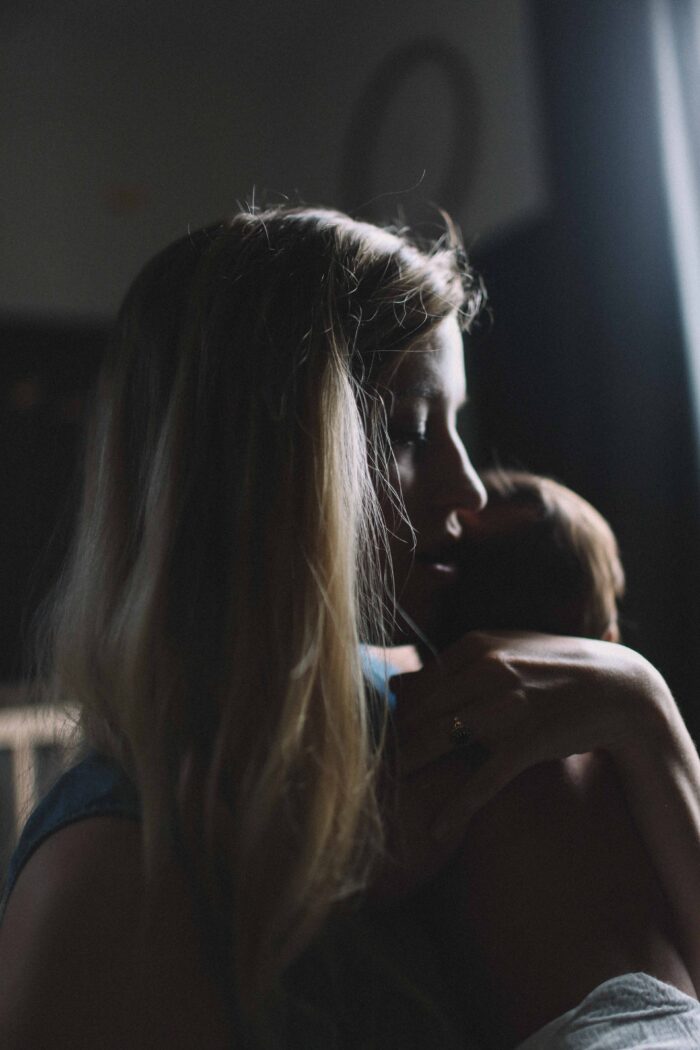Inhale & Exhale: The Fight Against Postpartum Depression & Anxiety
March 14, 2023 |CONTENT WARNING: This post discusses topics - including suicidal thoughts, mental illness, and weapons - that some readers may find distressing. Continue reading at your own discretion.
There is a common belief that childbirth is a magical time for mothers, and that when a baby is born, beautiful maternal feelings magically appear. For many women, this isn't the case. They battle feelings of anxiety, depression, sadness, powerlessness, and the inability to care for their infant.
Below, three Candelen employees - Ashleigh, Ruth, and Kerrie - tell the stories of their battles with postpartum depression and anxiety.

Kerrie: Throughout my entire first pregnancy, I was beyond excited for the day that my daughter would arrive. Yet when that day did arrive, I looked at her and felt no sense of attachment. Throughout weeks of pain, exhaustion, and cluelessness of being a new parent, I still did not feel a bond with her! I developed intrusive thoughts of being a horrible mother, which slowly turned into, "I'm such a bad mother, my daughter would be better off without me." I was even hyper-aware of the gun my husband kept in the closet. Finally, one month into parenthood, I developed the bond I'd been searching for and this little human became my entire life.
Ruth: For me, [postpartum depression] felt like existing eccentric worries, anxieties, and fears were supersized with each of my pregnancies. Part of my depression came from a complete lack of identity. My second daughter was born seven years after my first, and I thought I was better equipped to handle it. Instead, it felt harder to bounce back with my new body, our new sleep schedules, and my new identity as a mother of two.
Kerrie: Exhaustion and burnout kept creeping in and I started to despise everyone around me. At the slightest inconvenience caused by another person, I found myself wishing they'd die. That scared me, and those intrusive thoughts lasted for months. While they eventually went away, I still wasn't fully myself.
Ashleigh: I started experiencing debilitating anxiety in 2011. I now know that it was postpartum anxiety, but no one warned me of this beast. I'd just jumped head-first into being a mother and was experiencing fear on a level I didn't know existed. When I became a mother again just one year later, I was merely managing. At this point, I'd been living with anxiety - both before birth and postpartum - for so long that I just accepted this constant cloud of terror to be the "norm" and surrendered to the fact that it was just how motherhood goes. I was constantly on the brink of a mental breakdown, living in the space of what-if, and never present in the moment of these two beautiful children growing up before my eyes. I was so consumed with the possibility of danger that all I could feel was the anticipatory grief of losing one of [my children] to something I couldn't control.
Anxiety is one of those friends that you know is harmful to you, but the fear of not having her in your life is more daunting than getting rid of her.
Ashleigh Leonard
Coach Supervisor
Ruth: My first pregnancy was manageable, but my second pregnancy impacted my anxiety in a very physical way. It increased to the point of panic attacks and insomnia.
Kerrie: During my second pregnancy, I equated my worth with how productive I was around the house instead of focusing on spending time with my newborn. Dishes were piling up and laundry was strewn everywhere, and I was too busy having a rough time getting my baby to breastfeed. I felt worthless and thoughts of suicide crept up again. I believed that I wouldn't really act on my intrusive thoughts, and thankfully I didn't, but I now realize how easily I could have. I didn't tell anyone because I was scared of what they'd think.

Ashleigh: I [ended up] seeking help outside of myself in 2015 because I knew I either needed assistance or I needed out of this life. I began seeing a therapist, and for the first time... I felt relief. I could breathe a little bit deeper. I had someone who could see and understand my internal struggles in a way that made me feel normal. I started to actually move through my anxiety (not just manage it!) by gaining tools that helped me live in peace without it ruining my life.
Kerrie: At the time I experienced postpartum depression, it (along with other mental illnesses) wasn't commonly discussed. The stigma around receiving help for mental illness was alive and well. The experiences I had did not match what I saw on television, but there's a wide range of what it can look like. Because of this, it never even crossed my mind that these thoughts and feelings were postpartum depression.
Ruth: Two and a half years later, I finally feel like I am slowly becoming myself. If you are experiencing postpartum depression and anxiety, my advice is to embrace your new life and not expect your emotions, lifestyle, or perspective to go back to the way it was before children.
Kerrie: Even though [women's] experiences with postpartum depression are different, there is a resounding similarity. We're scared. We think we are awful mothers. We're hesitant to seek help because we don't want to lose our babies. We feel alone. I hope all women know that support and resources exist to help us navigate our new lives as mothers.
Ashleigh: When I had my last (and final) baby in 2020, there was a glimmer of peace. This was the moment I knew that I'd done the hard work in therapy, leaned into years of trauma, and came out on the other side with hope. Anxiety is still in my life - and she likes to flaunt her stuff at times - but I'm able to look her straight in the face and say, "Hi, friend. I see you, and it's okay that you're there, but you don't get to tell my story anymore."
Resources
Looking to learn more, start a conversation, or receive help? Here are some of our recommended resources to get started:
Hear Her Concerns
Pregnancy & PPD Support Groups
Therapeutic Support for Mothers
Postpartum Information
National Maternal Mental Health Hotline
National Child & Maternal Health Education Program
If you or anyone you know is experiencing crises or thoughts of self harm, contact the 988 Suicide & Crisis Lifeline for support.

Ashleigh Leonard has been described as having the warmth and comfort of freshly baked bread. She is the mom of three; two tween boys and a very strong, opinionated 2-year-old girl. Ashleigh is always up for a coffee date, road trip, or just a good conversation.

Ruth Ray has worked with Candelen for almost 10 years in Quality First Coaching, where she has held various positions. She currently serves as Director of Early Learning Professional Support. Ruth has two daughters - an 8-year-old and a toddler - and has lived in Phoenix for the past 11 years.

Kerrie Van Curan has worked in education for over 10 years in both Texas and Arizona. She has a Master's in Education with a concentration in child development and is currently working on her Master's in Organizational Management. Kerrie joined Candelen in 2022 to support Phoenix's communities and build relationships with parents and caregivers. She loves connecting with people and supporting them by providing education and resources to families in a way that is unique to each person she meets.
Candelen would like to extend our gratitude to Ashleigh, Ruth, and Kerrie for their honesty and vulnerability. Their willingness to open up about their battles, families, and experiences provides a foundation for others to address these raw, difficult conversations in their own homes and spaces.
- Love is a Professional Word - April 25, 2023
- Candelen Announces New Chief Executive Officer, Rob Podlogar - March 30, 2023
- Inhale & Exhale: The Fight Against Postpartum Depression & Anxiety - March 14, 2023

